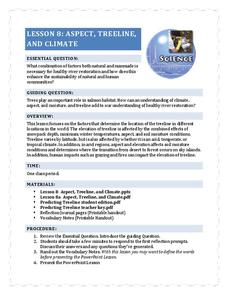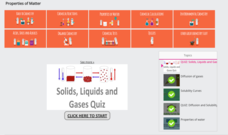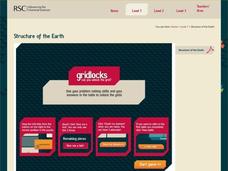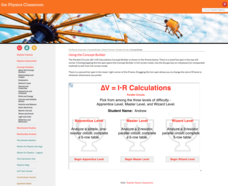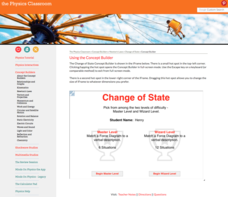California Mathematics Project
Reflections
Reflections are the geometric mirror. Pupils explore this concept as they discover the properties of reflections. They focus on the coordinates of the reflections and look for patterns. This is the third lesson in a seven-part series.
Teach Engineering
Maximum Power Point
Investigate the maximum power output of a photovoltaic panel with a lesson that introduces the class to the maximum power point. Individuals learn how to determine the maximum power point of a solar panel by using Ohm's law and the power...
Teach Engineering
Android Acceleration
Prepare to accelerate your Android. Pupils prep for the upcoming activity in this third installment of a four-part series. The lesson progresses nicely by first introducing different types of acceleration to the class. The teacher...
Teach Engineering
Exploring Acceleration with an Android
Small groups use rubber bands to accelerate an Android device along a track of books. They collect the acceleration data and analyze it in order to determine the device's velocity.
Teach Engineering
Design Step 2: Research the Problem
How do you get started designing a product to meet your engineering design goals? Here, learners gain understanding of an important aspect of the engineering design process: background research. Through brainstorming and worksheets,...
Beauty and Joy of Computing
Nesting Lists
Create lists within lists. The second lab in a series of five in the unit has pupils develop a simple contact list app. The tasks within the lab build the need for an abstract data type. Individuals build more complexity into their...
CK-12 Foundation
Expand and Contract
Gaps are essential to engineering bridges and roads. Learners watch a video showing a typical construction of a bridge to see why they're so important. They then manipulate an interactive to model the effects of temperature change on the...
CK-12 Foundation
It's Just a Phase
Explore the phases of water as temperature rises. Pupils consider the idea that temperature remains constant during each phase change. An interactive exercise allows your young scientists to observe the temperature and molecular...
Roy Rosenzweig Center for History and New Media
Early English Settlements History Detectives
Young historians play the role of history detectives as they investigate some primary source texts and images related to the early colonization of America, The Jamestown Settlement, and the Mayflower Compact.
National Park Service
Aspect, Treeline, and Climate
Head to the treeline and beyond to examine how this feature of the landscape affects weather and climate, which gives scientists clues about its health. Class members' observations of photographs provide the data...
Fuse School
Quiz: Solids, Liquids and Gases
Time to show what they know! Module five in a 14-part series about solids, liquids, and gases redirects to an interactive quiz. Learners test their skills on topics such as states of matter, phase changes, and Brownian Motion. With...
Education Development Center
Proof with Parallelogram Vertices
Geometric figures are perfect to use for proofs. Scholars prove conjectures about whether given points lie on a triangle and about midpoints. They use a provided dialogue among fictional students to frame their responses.
Museum of Tolerance
Documents That Shape Society
The Bill of Rights is a foundational document of American democracy, much like the Nuremberg Laws were a foundational document of the Reichstag of Nazi Germany. But that's where their similarities end. Engage high schoolers in a...
Royal Society of Chemistry
Alkalis and Salts
Gamification is an educational sensation! Young scientists build their acid-base vocabulary skills through a series of puzzles focused on bases and the salts they form. The challenging activity comes complete with a printable version and...
Royal Society of Chemistry
Structure of the Earth
What lies beyond the ground beneath our feet? Young geologists learn the four main layers of Earth with an engaging puzzle set. The interactive illustrates each layer, and users must place them correctly before they can progress to the...
Colorado State University
What Is a "Convection Cell"?
Round and round in circles it goes! A hands-on activity has learners recreate a model of a convection cell. They watch as the difference in density of their materials creates a current.
Howard Hughes Medical Institute
Stalking the Genetic Basis of a Trait
Need an a-maize-ing lesson to show your class how regulatory genes work? If you use the well-written resource, they'll be all ears! Biology scholars discover the gene responsible for the evolution of the modern-day corn plant through a...
Howard Hughes Medical Institute
Niche Partitioning and DNA Metabarcoding
What is DNA metabarcoding? Show your biology class the latest method for studying biodiversity in an ecosystem with a fun, informative interactive. Individuals examine the animal species that compete for vegetation, then learn how their...
US Institute of Peace
Defining Conflict
Before there can be peace, we have to understand conflict. Introduce the concept of conflict through a two-part activity that combines discussion, collaboration, and writing. The first in a 15-part series examines the multiple meanings...
Physics Classroom
Position-Time Graphs - Conceptual Analysis
Increasingly, colleges and employers want applicants with strong conceptual analysis skills, so give them some practice! Applying these skills to position-time graphs encourages synthesis of knowledge. To complete an installment of a...
Physics Classroom
Parallel Circuits - ∆V = I•R Calculations
Parallel circuits often provide less of a challenge for teens than parallel parking. An installment of a series on parallel electric circuits requires learners to solve increasingly difficult levels of calculations. Each level...
Physics Classroom
Match That Graph
Matchy-matchy no longer exclusively applies to fashion. Scholars work through three levels of practice matching position and velocity graphs. Part of a series covering dimensional kinematics, each question provides immediate feedback and...
Physics Classroom
Dots and Graphs
Scholars demonstrate understanding of kinematic graphs through matching dot graphs to position time graphs, dot graphs to velocity graphs, and a mixture of the two. If users feel stuck or confused, a Help Me! button offers an explanation...
Physics Classroom
Change of State
Free-body diagrams display all forces acting on an object, helping scientists represent Newton's Laws of Motion. Scholars read a short description of motion and view the free-body diagram to begin the installment of a larger series on...











